新东方白易礼语法笔记
白易礼:大学英语四级考试语法笔记44

白易礼:大学英语四级考试语法笔记44We couldn't but weep at the sad news.You can't but respect them.Rather than和sooner than同义,都是"宁可","与其...(不如)","不是...(而是)"的意思。
当它们放在句首时,其后跟不带to的不定式;在其它位置时其后的不定式可带也可不带to:Rather than risk breaking up his marriage, he told his wife everything. 他把一切都告诉了妻子,而不是冒离婚的危险。
Rather than cause trouble, he left. 他宁可走开而不愿引起麻烦。
Sooner than marry that man, she would earn her living as a waitress. 她宁可当女招待养活自己,也不嫁给那个男人。
He decided to write rather than telephone. 他决定写信,不打电话。
The manager believes it is important to invest in new machinery rather than to increase wages. 经理相信重要的是投资买新机器,而不是增加工资。
Rather than John do it, I'd prefer to do the job myself. 与其让John干这件事情,我宁可自己动手。
4、有些动词要求省掉to的不定式作宾语补语。
在Why 起首的疑问句中跟不带to的不定式:Why not come with us? 为什么不跟我们一起来呢? =Why don' t you come with us?Why not go for a game of tennis? 为什么不去打网球呢?Why not relax yourself? 为什么不放松你自己呢?Why not try to train your character? 为什么不培养你的性格呢?Why not give the $40 to Tom? 干吗不把那40美金给汤姆呢?For God's sake, why bring that up again? 看在上帝的份上,干吗又提这事呢?Why split hairs over the color of the dress? 干吗对连衣裙的颜色吹毛求疵呢?Why run this risk? 干吗冒这个险?Why risk breaking the law? 干吗冒犯法的险呢?5、不定式作宾语而后面还有宾语补语时,常用it来代替不定式短语,而把真正作宾语的不定式短语放在补足语后面。
新东方白易礼:英语四级考试语法笔记9
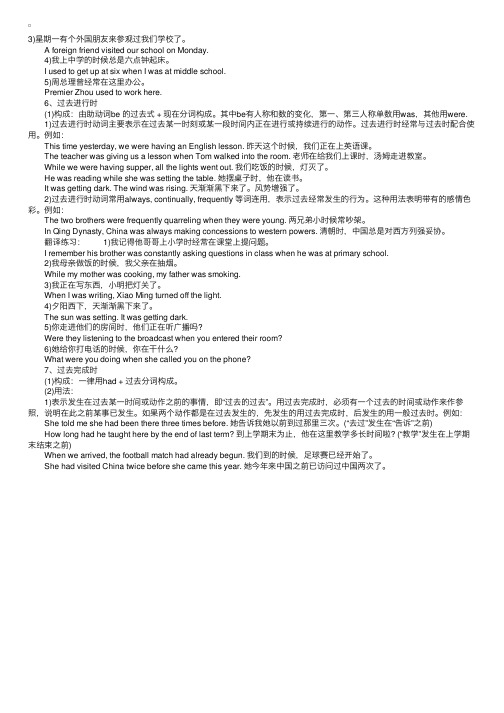
3)星期⼀有个外国朋友来参观过我们学校了。
A foreign friend visited our school on Monday. 4)我上中学的时候总是六点钟起床。
I used to get up at six when I was at middle school. 5)周总理曾经常在这⾥办公。
Premier Zhou used to work here. 6、过去进⾏时 (1)构成:由助动词be 的过去式 + 现在分词构成。
其中be有⼈称和数的变化,第⼀、第三⼈称单数⽤was,其他⽤were. 1)过去进⾏时动词主要表⽰在过去某⼀时刻或某⼀段时间内正在进⾏或持续进⾏的动作。
过去进⾏时经常与过去时配合使⽤。
例如: This time yesterday, we were having an English lesson. 昨天这个时候,我们正在上英语课。
The teacher was giving us a lesson when Tom walked into the room. ⽼师在给我们上课时,汤姆⾛进教室。
While we were having supper, all the lights went out. 我们吃饭的时候,灯灭了。
He was reading while she was setting the table. 她摆桌⼦时,他在读书。
It was getting dark. The wind was rising. 天渐渐⿊下来了。
风势增强了。
2)过去进⾏时动词常⽤always, continually, frequently 等词连⽤,表⽰过去经常发⽣的⾏为。
这种⽤法表明带有的感情⾊彩。
例如: The two brothers were frequently quarreling when they were young. 两兄弟⼩时候常吵架。
新东方白易礼语法笔记7 (1)

语法系列讲座22作从句的宾语。
关系代词在从句中作宾语时可以省略,因此上句又可变成“have you found the book you were looking for yesterday?”.请同学们照上面的例子,把下面变定语从句的步骤说出来(括号里的可以省略):( 1 ) "The dog belongs to the Browns. It ate my fish yesterday."……The dog which/that ate my fish yesterday belongs to the Browns。
(2) "The lady has gone to the police station. Her car has been stolen."……The lady whose car has been stolen has gone to the police station.(3) "I' ve seen the film. His girl friend played the leading role In it.''……I' ve seen the film {which / that) his girl friend played the leading role in……I’ve seen the film in which his girl friend played the leading role.……His girl friend played the leading role in the film {which/that) I’ve seen.关系副词与此同理。
只是关系副词代替的是原句中的状语。
在被代替之前,这个状语中一定要含有一个与另一句相同的成分。
例如:This is the house甲I was barn and brought up in the house.在这两个句子中,in the house是句子里的地点状语,定语从句修饰的就是the house。
新东方白易礼语法笔记11

语法系列讲座29例如:It is five kilometers from my home to the school.从我家到学校有五公里。
It is very near from this factory to that one.从这个工厂到那个工厂非常近。
It is a long way to the sea. 离海很远。
Is it well with you? 你身体好吗?二、it作形式主语动词不定式、动名词短语起、从句在句子中起主语作用,而这一部分用词较多时,可以用it作为形式主语,放在句首代表其后所说的事实上的、真正的主语,而把真正的主语放在后面。
1.It +谓语+动词不定式。
It 作形式主语,动词不定式作真正的主语。
例如:It is difficult to climb a mountain. 爬山是很艰难的。
It’s a good habit to do morning exercises. 作早操是个好习惯。
It’s important to do proper memory work in the study of a foreign language. 在学习外语时适当地做一些有助于记忆的练习是很重要的。
It is right to do so. 这样做是对的。
2.It+谓语+动名词短语。
It 作形式主语,动名词短语作真正的主语。
例如:It is dangerous playing with fire. 玩火是危险的。
It is no use learning without thinking. 学而不思则罔。
It’s useless arguing with a silly boy. 和笨孩子争论是没有用的。
3.It +谓语+名词性从句。
It 作形式主语,以that 引导的名词性从句是真正的主语。
例如:It is a pity that you didn’t see such a good film.你没看这么好的电影,真可惜。
新东方白易礼语法笔记8 (1)

语法系列讲座23如:Peter is the one who everybody believes will fail to bring off the contract. Peter 是那个人人都认为不能完成合同的人。
(everybody believes 是插入语)At the election I voted for the man whom I believed to be the most suitable.在选举的时候我投了我认为最合适的那个人的票。
5.关系代词作从句的主语时,从句的动词必须和先行词的人称和数一致:例:These are the operating instructions that/which are written in English 。
这就是用英文写成的使用说明。
Are you staying at the white house which/that is newly completed and which /that has 15 bedrooms, 3 kitchens and 4 toilets?你是住在那幢刚刚竣工、有15个卧室、3个病房和4个卫生间的白色房子里吗?So far as I know, there are many VIPs who are going to attend the reception.就我所知有很多达官贵人将出席这个招待会。
6.非限定性定语从句不用that,只用who(whose, whom)和which代表人和物;例:Her brothers, both of whom work in America, ring her up every week。
她的兄弟们??两个人都在美国工作??每个星期都给她打电话。
The buses, most of which were already full, were surrounded by an angry crowd,那些公共汽车??大多已经坐满了人??被一群愤怒的人围着。
新东方白易礼语法笔记9
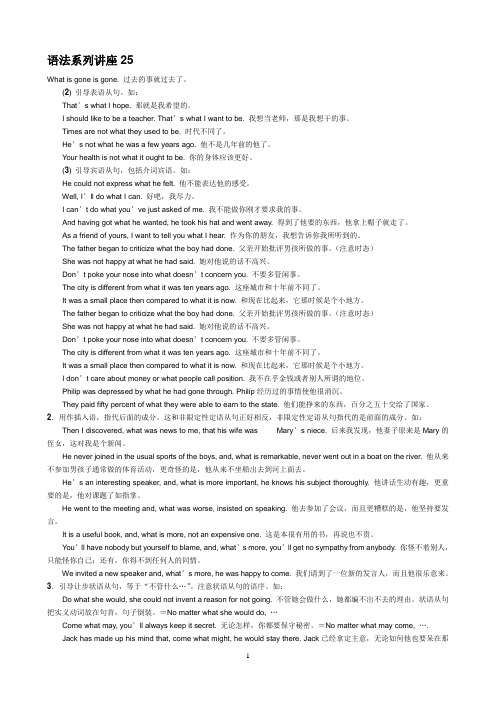
语法系列讲座25What is gone is gone. 过去的事就过去了。
(2) 引导表语从句。
如:That’s what I hope. 那就是我希望的。
I should like to be a teacher. That’s what I want to be. 我想当老师,那是我想干的事。
Times are not what they used to be. 时代不同了。
He’s not what he was a few years ago. 他不是几年前的他了。
Your health is not what it ought to be. 你的身体应该更好。
(3) 引导宾语从句,包括介词宾语。
如:He could not express what he felt. 他不能表达他的感受。
Well, I’ll do what I can. 好吧,我尽力。
I can’t do what you’ve just asked of me. 我不能做你刚才要求我的事。
And having got what he wanted, he took his hat and went away. 得到了他要的东西,他拿上帽子就走了。
As a friend of yours, I want to tell you what I hear. 作为你的朋友,我想告诉你我所听到的。
The father began to criticize what the boy had done. 父亲开始批评男孩所做的事。
(注意时态)She was not happy at what he had said. 她对他说的话不高兴。
Don’t poke your nose into what doesn’t concern you. 不要多管闲事。
The city is different from what it was ten years ago. 这座城市和十年前不同了。
新东方白易礼:英语四级考试语法笔记7
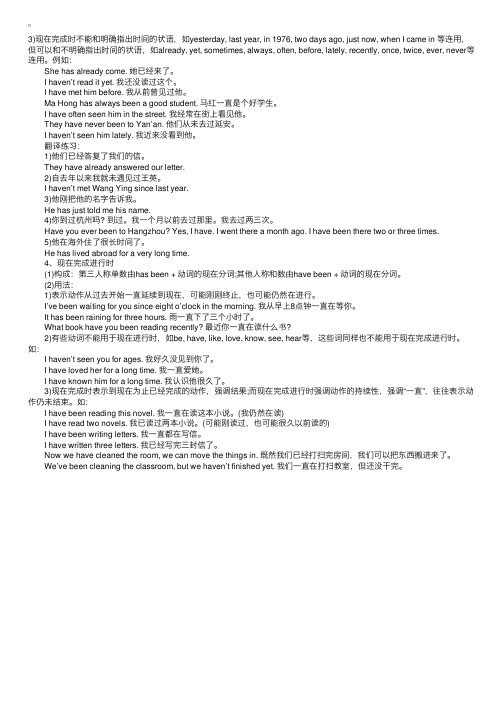
3)现在完成时不能和明确指出时间的状语,如yesterday, last year, in 1976, two days ago, just now, when I came in 等连⽤,但可以和不明确指出时间的状语,如already, yet, sometimes, always, often, before, lately, recently, once, twice, ever, never等连⽤。
例如: She has already come. 她已经来了。
I haven’t read it yet. 我还没读过这个。
I have met him before. 我从前曾见过他。
Ma Hong has always been a good student. 马红⼀直是个好学⽣。
I have often seen him in the street. 我经常在街上看见他。
They have never been to Yan’an. 他们从未去过延安。
I haven’t seen him lately. 我近来没看到他。
翻译练习: 1)他们已经答复了我们的信。
They have already answered our letter. 2)⾃去年以来我就未遇见过王英。
I haven’t met Wang Ying since last year. 3)他刚把他的名字告诉我。
He has just told me his name. 4)你到过杭州吗? 到过。
我⼀个⽉以前去过那⾥。
我去过两三次。
Have you ever been to Hangzhou? Yes, I have. I went there a month ago. I have been there two or three times. 5)他在海外住了很长时间了。
He has lived abroad for a very long time. 4、现在完成进⾏时 (1)构成:第三⼈称单数由has been + 动词的现在分词;其他⼈称和数由have been + 动词的现在分词。
新东方白易礼语法笔记12

当主句的have不表示“拥有”而表示其他意思时,附加疑问要用do,如:You had a cold yesterday, didn’t you?They don’t have coffee with breakfast, do they?8.There be句型的反意疑问句,用there 作主语。
如:There is something wrong, isn’t there?There won’t be any trouble, will there? 不会有任何麻烦,是吗?9.陈述部分的主语是everyone, someone, anyone, no one, nobody等不定代词时,其疑问部分的主语可用he, 也可用they.如:Everyone knows it, doesn’t he/don’t they?英语反意疑问句的回答有点和汉语的相反。
但一定要记住:只要回答是肯定的,都用yes,只要回答是否定的,都用no。
这在主句是否定句的时候要特别注意。
例如:Mr. Jones can’t speak French, can he? ?No, he can’t.琼斯先生不会讲法语,对吗??对,他不会讲法语。
Mr. Jones can’t speak French, can he? ?Yes, he can.琼斯先生不会讲法语,对吗??不,他会讲法语。
This is not a door, is it? -Yes, it is. It is an iron door.这不是门,对吗??不,这是门。
是扇铁门。
练习完成下列反意疑问句,并译出后面的回答。
1)There is a dog under the tree, _____? 是的,有。
→isn’t there? Yes, there is.2)They are laughing at me, ____? 不,没有。
/ 对,是的。
→aren’t they? No, they aren’t. / Yes, they are.3)We haven’t visited that college, _____? 对,还没有。
新东方白易礼语法笔记
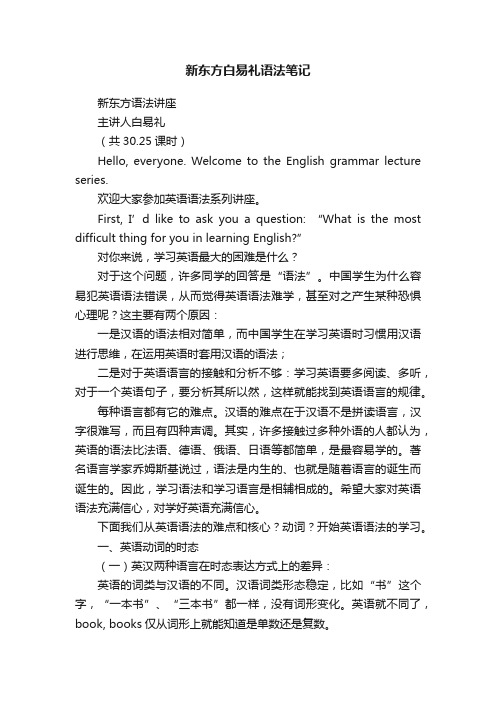
新东方白易礼语法笔记新东方语法讲座主讲人白易礼(共30.25课时)Hello, everyone. Welcome to the English grammar lecture series.欢迎大家参加英语语法系列讲座。
First, I’d like to ask you a question: “What is the most difficult thing for you in learning English?”对你来说,学习英语最大的困难是什么?对于这个问题,许多同学的回答是“语法”。
中国学生为什么容易犯英语语法错误,从而觉得英语语法难学,甚至对之产生某种恐惧心理呢?这主要有两个原因:一是汉语的语法相对简单,而中国学生在学习英语时习惯用汉语进行思维,在运用英语时套用汉语的语法;二是对于英语语言的接触和分析不够:学习英语要多阅读、多听,对于一个英语句子,要分析其所以然,这样就能找到英语语言的规律。
每种语言都有它的难点。
汉语的难点在于汉语不是拼读语言,汉字很难写,而且有四种声调。
其实,许多接触过多种外语的人都认为,英语的语法比法语、德语、俄语、日语等都简单,是最容易学的。
著名语言学家乔姆斯基说过,语法是内生的、也就是随着语言的诞生而诞生的。
因此,学习语法和学习语言是相辅相成的。
希望大家对英语语法充满信心,对学好英语充满信心。
下面我们从英语语法的难点和核心?动词?开始英语语法的学习。
一、英语动词的时态(一)英汉两种语言在时态表达方式上的差异:英语的词类与汉语的不同。
汉语词类形态稳定,比如“书”这个字,“一本书”、“三本书”都一样,没有词形变化。
英语就不同了,book, books仅从词形上就能知道是单数还是复数。
动词是英语中变化最多、最复杂的词类。
有人说,学好英语就是学好动词,此言甚是。
同一个动作或状态分别在不同时间发生或存在,表达这个动作或状态的动词就要用不同的形式,这就是时态。
例如:在“中国是个伟大的国家。
新东方白易礼语法笔记6 (1)
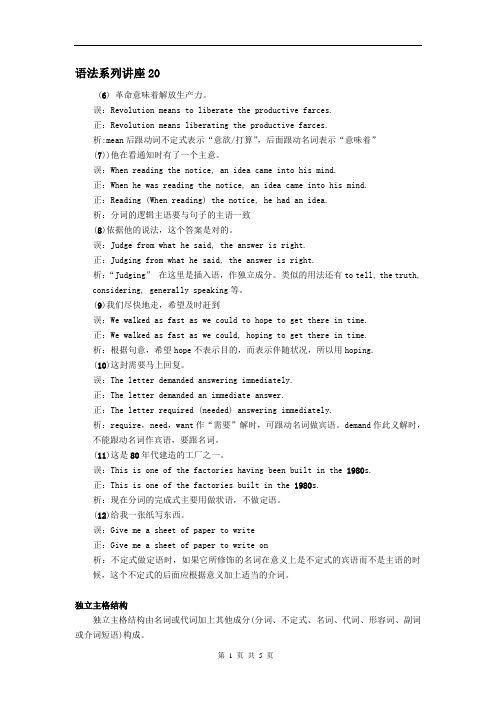
语法系列讲座20(6) 革命意味着解放生产力。
误:Revolution means to liberate the productive farces.正:Revolution means liberating the productive farces.析:mean后跟动词不定式表示“意欲/打算”,后面跟动名词表示“意味着”(7))他在看通知时有了一个主意。
误:When reading the notice, an idea came into his mind.正:When he was reading the notice, an idea came into his mind.正:Reading (When reading) the notice, he had an idea.析:分词的逻辑主语要与句子的主语一致(8)依据他的说法,这个答案是对的。
误:Judge from what he said, the answer is right.正:Judging from what he said, the answer is right.析:“Judging”在这里是插入语,作独立成分。
类似的用法还有to tell, the truth, considering, generally speaking等。
(9)我们尽快地走,希望及时赶到误:We walked as fast as we could to hope to get there in time.正:We walked as fast as we could, hoping to get there in time.析:根据句意,希望hope不表示目的,而表示伴随状况,所以用hoping.(10)这封需要马上回复。
误:The letter demanded answering immediately.正:The letter demanded an immediate answer.正:The letter required (needed) answering immediately.析:require,need,want作“需要”解时,可跟动名词做宾语。
新东方白易礼语法笔记5

语法系列讲座181.作定语。
作定语的分词通常放在被修饰的名词之前。
如果被修饰的词是something,anything,everything,nothing等,则分词放在这些词之后。
分词短语通常放在被修饰的名词之后。
例如:This is an interesting book。
(=This is a book。
It is interesting。
)这是一本有趣的书。
There is something interesting in the news。
(=There is something in the news。
It is interesting。
)消息中有些有趣的事。
The man sitting by the window is our math teacher。
(=The man who is sitting by the window is our math teacher。
)靠窗户坐着的那个人是我们的数学老师The machine run by the old worker is made in Shanghai。
(=The machine that is run by the old worker is made in Shanghai。
)那位老工人开的机器是上海造的。
Most of students singing were girls。
(=Most of the students who were singing…)唱歌的学生多数是女生。
Many of the villagers questioned refused to answer。
(=Many of the villagers who were questioned…)被问的许多村里人都拒绝。
注意:(1)分词作定语与动名词作定语的区别:分词和它所修饰的名词有逻辑上的主、谓关系。
动名词则没有这种关系,而表示它所修饰的现在分词和它所修饰的名词都要重读,动名词所修饰的名词则不必重读。
新东方白易礼语法笔记10
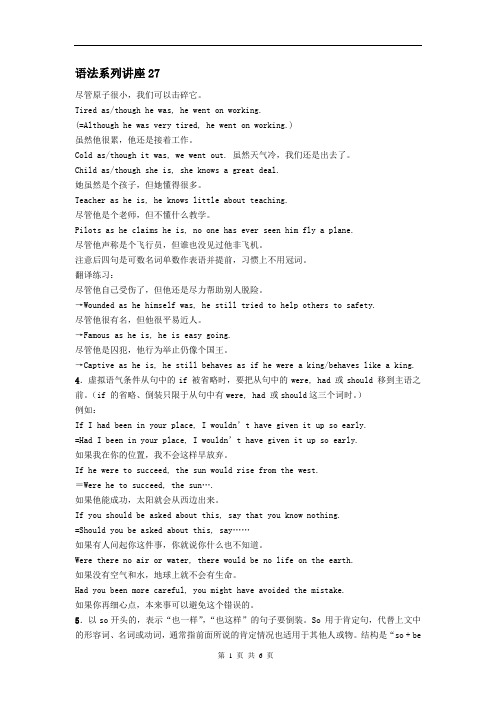
语法系列讲座27尽管原子很小,我们可以击碎它。
Tired as/though he was, he went on working.(=Although he was very tired, he went on working.)虽然他很累,他还是接着工作。
Cold as/though it was, we went out. 虽然天气冷,我们还是出去了。
Child as/though she is, she knows a great deal.她虽然是个孩子,但她懂得很多。
Teacher as he is, he knows little about teaching.尽管他是个老师,但不懂什么教学。
Pilots as he claims he is, no one has ever seen him fly a plane.尽管他声称是个飞行员,但谁也没见过他非飞机。
注意后四句是可数名词单数作表语并提前,习惯上不用冠词。
翻译练习:尽管他自己受伤了,但他还是尽力帮助别人脱险。
→Wounded as he himself was, he still tried to help others to safety.尽管他很有名,但他很平易近人。
→Famous as he is, he is easy going.尽管他是囚犯,他行为举止仍像个国王。
→Captive as he is, he still behaves as if he were a king/behaves like a king. 4.虚拟语气条件从句中的if 被省略时,要把从句中的were, had 或should 移到主语之前。
(if 的省略、倒装只限于从句中有were, had 或should这三个词时。
)例如:If I had been in your place, I wouldn’t have given it up so early.=Had I been in your place, I wouldn’t have given it up so early.如果我在你的位置,我不会这样早放弃。
白易礼:大学英语四级考试语法笔记32

3、⽤被动语态翻译以下句⼦(做翻译时,⾸先要看⽤什么句型和结构,再看⽤什么谓语动词,然后看⽤什么时态。
这些是汉译英的关键。
) 1)没有⼈强迫你去做那项⼯作。
You are not forced/compelled to do the work. 2)这个班由布朗先⽣教英语。
The class is taught English by Mr. Brown. 3)那棵⼤树被风刮倒了。
That big tree was blown down by the wind. 4)这间教室靠两个⽕炉取暖。
This classroom is heated by two stoves. 5)这篇⽂章是汤姆写的吗? Was the article written by Tom? 6)你会得到⽼师们的帮助。
You will be helped by the teachers. 7)恐怕你要挨批评了。
I am afraid you will be criticized. 8)那封信已由王林写好。
The letter has been written by Wang Lin. 9)电影放映之前,票已全部售出。
All the tickets had been sold out before the film began. 10)试卷上所有的题⽬都必须做吗? Must all the questions on the paper be answered? 11)我们学校正在修建⼀个新的化学实验室。
A new chemistry lab is being built in our school. 12)电视机关上了。
The television has been turned off. 13)在⽣产中可以很好地利⽤原⼦能。
Atomic/Nuclear energy can be made good use of in production. 14)⼤家知道,物质是在不断运动和变化的。
新东方白易礼:英语四级考试语法笔记4
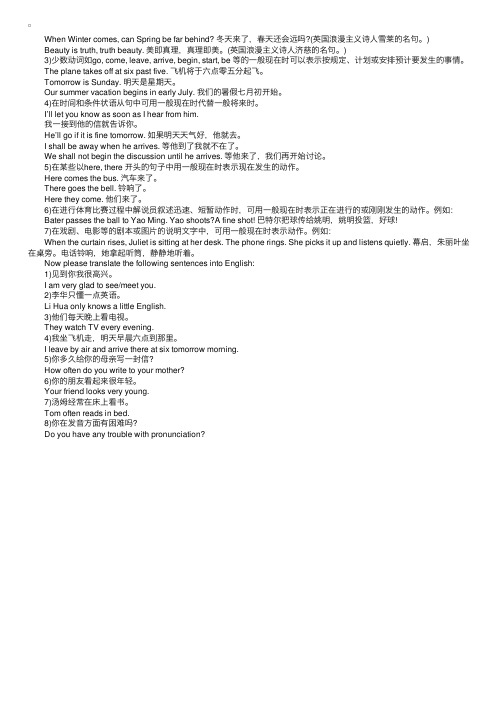
When Winter comes, can Spring be far behind? 冬天来了,春天还会远吗?(英国浪漫主义诗⼈雪莱的名句。
) Beauty is truth, truth beauty. 美即真理,真理即美。
(英国浪漫主义诗⼈济慈的名句。
) 3)少数动词如go, come, leave, arrive, begin, start, be 等的⼀般现在时可以表⽰按规定、计划或安排预计要发⽣的事情。
The plane takes off at six past five. 飞机将于六点零五分起飞。
Tomorrow is Sunday. 明天是星期天。
Our summer vacation begins in early July. 我们的暑假七⽉初开始。
4)在时间和条件状语从句中可⽤⼀般现在时代替⼀般将来时。
I’ll let you know as soon as I hear from him. 我⼀接到他的信就告诉你。
He’ll go if it is fine tomorrow. 如果明天天⽓好,他就去。
I shall be away when he arrives. 等他到了我就不在了。
We shall not begin the discussion until he arrives. 等他来了,我们再开始讨论。
5)在某些以here, there 开头的句⼦中⽤⼀般现在时表⽰现在发⽣的动作。
Here comes the bus. 汽车来了。
There goes the bell. 铃响了。
Here they come. 他们来了。
6)在进⾏体育⽐赛过程中解说员叙述迅速、短暂动作时,可⽤⼀般现在时表⽰正在进⾏的或刚刚发⽣的动作。
例如: Bater passes the ball to Yao Ming. Yao shoots?A fine shot! 巴特尔把球传给姚明,姚明投篮,好球! 7)在戏剧、电影等的剧本或图⽚的说明⽂字中,可⽤⼀般现在时表⽰动作。
新东方白易礼:英语四级考试语法笔记3
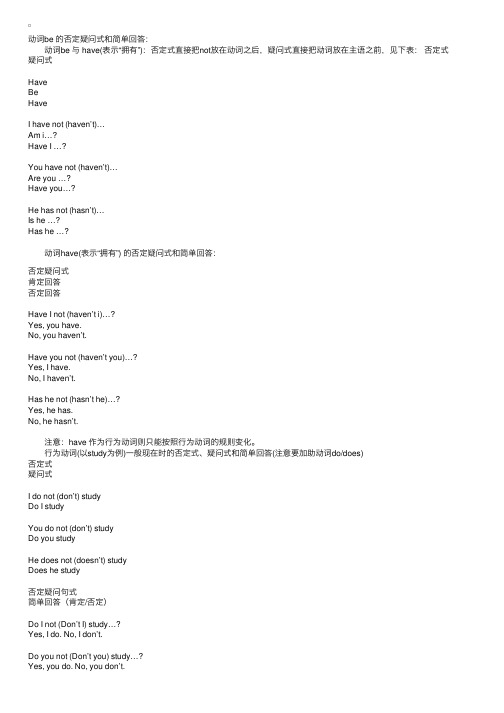
动词be 的否定疑问式和简单回答: 动词be 与 have(表⽰“拥有”):否定式直接把not放在动词之后,疑问式直接把动词放在主语之前,见下表:否定式疑问式HaveBeHaveI have not (haven’t)…Am i…?Have I …?You have not (haven’t)…Are you …?Have you…?He has not (hasn’t)…Is he …?Has he …? 动词have(表⽰“拥有”) 的否定疑问式和简单回答:否定疑问式肯定回答否定回答Have I not (haven’t i)…?Yes, you have.No, you haven’t.Have you not (haven’t you)…?Yes, I have.No, I haven’t.Has he not (hasn’t he)…?Yes, he has.No, he hasn’t. 注意:have 作为⾏为动词则只能按照⾏为动词的规则变化。
⾏为动词(以study为例)⼀般现在时的否定式、疑问式和简单回答(注意要加助动词do/does)否定式疑问式I do not (don’t) studyDo I studyYou do not (don’t) studyDo you studyHe does not (doesn’t) studyDoes he study否定疑问句式简单回答(肯定/否定)Do I not (Don’t I) study…?Yes, I do. No, I don’t.Do you not (Don’t you) study…?Yes, you do. No, you don’t.Does he not (Doesn’t he) study…?Yes, he does. No, he doesn’t. (2)⽤法: 1)⼀般现在时表⽰现状、性质、状态和经常的或习惯性的动作。
白易礼:大学英语四级考试语法笔记51
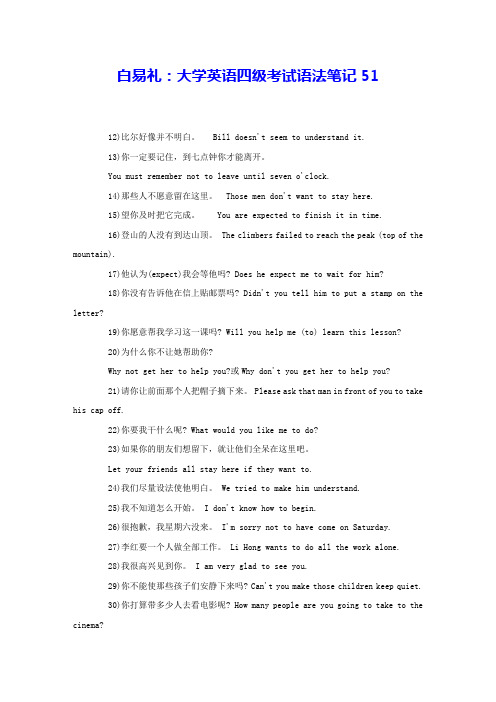
白易礼:大学英语四级考试语法笔记5112)比尔好像并不明白。
Bill doesn't seem to understand it.13)你一定要记住,到七点钟你才能离开。
You must remember not to leave until seven o'clock.14)那些人不愿意留在这里。
Those men don't want to stay here.15)望你及时把它完成。
You are expected to finish it in time.16)登山的人没有到达山顶。
The climbers failed to reach the peak (top of the mountain).17)他认为(expect)我会等他吗? Does he expect me to wait for him?18)你没有告诉他在信上贴邮票吗? Didn't you tell him to put a stamp on the letter?19)你愿意帮我学习这一课吗? Will you help me (to) learn this lesson?20)为什么你不让她帮助你?Why not get her to help you?或Why don't you get her to help you?21)请你让前面那个人把帽子摘下来。
Please ask that man in front of you to take his cap off.22)你要我干什么呢? What would you like me to do?23)如果你的朋友们想留下,就让他们全呆在这里吧。
Let your friends all stay here if they want to.24)我们尽量设法使他明白。
We tried to make him understand.25)我不知道怎么开始。
新东方白易礼语法笔记4

语法系列讲座16Since returning from Xi’an, he has been busy.从西安回来后,他一直很忙。
He warned me against swimming in this lake. 他警告我不要在这个湖里游泳。
改为不定式短语:He warned me not to swim in this lake.We came out without being seen. 我们出来没被人看见。
Before finishing your homework, yo u’d better not go out.做完作业之前,你最好别出去。
改为用before 作连词:Before you finish your homework, you’d better not go out.(四)动名词也可以有自己的逻辑主语,就是在动名词短语前面加上物主代词或名词的所有格。
带逻辑主语的动名词短语可做主语,宾语,表语等。
在非正式文体当中,经常把物主代词简化为宾格人称代词,把名词所有格简化为名词。
例如:I insisted on his (him) going to the cinema with me. 我坚持要他和我一起去看电影。
I can hardly imagine Peter(Peter’s) sailing across the Atlantic Ocean in five days. 我简直不能想象彼得会在五天内横渡大西洋。
Linda’s coming will do you good.(主语)林达的到来对你有好处。
What made him angry was their (them) laughing.(表语)使他生气的是他们笑。
(五)动名词的完成式和被动语态:(1)完成式表示动名词的动作发生在谓语动作之前。
例如:I apologize for having broken my promise. 我没有遵守诺言,我道歉。
新东方白易礼语法笔记8

语法系列讲座24注:④在same和such之后,定语从句用as引导,偶尔,the same 后面也用that,如:He’s wearing the same suit that he wore at Mary’s wedding.他穿着与他在Mary的婚礼上穿的一样的衣服。
She works in the same office that I do.她和我在同一个办公室工作。
This is the same watch that I have lost.这块表和我丢的那块一样。
as 引导非限定性定语从句即可放在主句之前,也可放在主句之后,用来修饰整个句子。
当as在从句中作主语时,后面常接下列句型。
如:as is known, as is said, as is reported as is announced 等。
例如:As we all know, Mr. Wang is a good teacher.As is known to all, the earth revolves round the sun.He is tired, as you can see.As I expected, he didn’t believe me.As 引导非限定性定语从句时与which的区别:当主句和从句语义一致时,用as;反之,用which。
如:He made a long speech, as was expected.He made a long speech, which was unexpected.Tom drinks a lot every day, which his w ife doesn’t like at all.(3)但是,如果从句和主句的动作在将来不同的时间发生,则两部分都要用来将来时,注:⑤在“介词+关系代词”的结构中,也可用复杂介词,如:by means of (用,依靠),as a result of (作为结果)等:例:I have three children, one daughter and two sons, all of whom graduated from the same university .我有三个孩子:一个女儿、两个儿子,他们都毕业于同一所大学。
新东方白易礼语法笔记6

语法系列讲座1916) As he was going downstairs he tripped on the carpet.-----Going downstairs he tripped on the carpet.17) When I was learning English, I had much trouble in pronunciation.-----When learning English, I had much trouble in pronunciation.18) As he himself was one of the exploited Pottier shared their bitterness and sufferings.-----Being one of the exploited himself Pottier shared their bitterness and sufferings.19) The bridge had been weakened by successive storms and was no longer safe. -----Weakened by successive storms, the bridge was no longer safe.20) What is the book? It is being translated.-----What is the book being translated?21) As we did not know his address we could not get in touch with him.-----Not knowing his address we could not get in touch with him.22) As she had been there many times, she knew the place quit well.-----Having been there many times, she knew the place quite well.23) As we had not got a reply from them, we became quite worried.-----Not having got a reply from them, we became quite worried.24) Because they had been brought up in the city, they knew little about farmwork. -----Having been brought up in the city, they knew little about farmwork.25) He was a League member. He ought to take the lead in such activities.-----Being a League member, he ought to take the lead in such activities. such activities.2、改正下列句子中的错误(注意分词短语的逻辑主语和句子的主语是否一致)。
新东方白易礼语法笔记3

语法系列讲座15(七)不定式的时态。
动词不定式一般有三种时态形式,即一般式、进行式和完成式。
(1)一般式(to+动词原形):表示与主句谓语动词动作同时(或几乎同时)发生或在主句谓语动词之后发生的事情。
例如:We’re happy to have you on our side. 有你在我们这边我们很高兴。
I saw him go out. 我看见他出去了。
(不定式go out 与see同时发生。
)They invited me to have dinner with them. 他们邀请我和他们一起吃晚饭。
I hope to see you again. 我希望再见到你(to see发生在hope之后)(2)进行式(to be+现在分词):表示主句谓语的动作发生时,不定式动作正在进行。
例如:She’s said /believed to be living nearby. 据说/据信她就住在附近。
When he came in, I happened to be sleeping in bed. 他进来时,我碰巧正在床上睡觉。
They seem/appear to be enjoying themselves. 看上去他们似乎很快活。
He pretended to be doing his homework when he heard his father’s sound. 他听见父亲的声音,假装正在做作业。
The president was reported to be visiting the hospital. 据报道总统正在访问那家医院。
(3)完成式(to have+过去分词):表示在主句谓语的动作之前发生的事情。
如:I’m glad to have met y our parents here. 我很高兴在这儿见到了你父母。
(已见过)I’m sorry to have kept him waiting for me so long.我很抱歉让他等了我这样久。
- 1、下载文档前请自行甄别文档内容的完整性,平台不提供额外的编辑、内容补充、找答案等附加服务。
- 2、"仅部分预览"的文档,不可在线预览部分如存在完整性等问题,可反馈申请退款(可完整预览的文档不适用该条件!)。
- 3、如文档侵犯您的权益,请联系客服反馈,我们会尽快为您处理(人工客服工作时间:9:00-18:30)。
新东方语法讲座主讲人白易礼(共30.25课时)Hello, everyone. Welcome to the English grammar lecture series.欢迎大家参加英语语法系列讲座。
First, I’d like to ask you a question: “What is the most difficult thing for you in learning English?”对你来说,学习英语最大的困难是什么?对于这个问题,许多同学的回答是“语法”。
中国学生为什么容易犯英语语法错误,从而觉得英语语法难学,甚至对之产生某种恐惧心理呢?这主要有两个原因:一是汉语的语法相对简单,而中国学生在学习英语时习惯用汉语进行思维,在运用英语时套用汉语的语法;二是对于英语语言的接触和分析不够:学习英语要多阅读、多听,对于一个英语句子,要分析其所以然,这样就能找到英语语言的规律。
每种语言都有它的难点。
汉语的难点在于汉语不是拼读语言,汉字很难写,而且有四种声调。
其实,许多接触过多种外语的人都认为,英语的语法比法语、德语、俄语、日语等都简单,是最容易学的。
著名语言学家乔姆斯基说过,语法是内生的、也就是随着语言的诞生而诞生的。
因此,学习语法和学习语言是相辅相成的。
希望大家对英语语法充满信心,对学好英语充满信心。
下面我们从英语语法的难点和核心?动词?开始英语语法的学习。
一、英语动词的时态(一)英汉两种语言在时态表达方式上的差异:英语的词类与汉语的不同。
汉语词类形态稳定,比如“书”这个字,“一本书”、“三本书”都一样,没有词形变化。
英语就不同了,book, books仅从词形上就能知道是单数还是复数。
动词是英语中变化最多、最复杂的词类。
有人说,学好英语就是学好动词,此言甚是。
同一个动作或状态分别在不同时间发生或存在,表达这个动作或状态的动词就要用不同的形式,这就是时态。
例如:在“中国是个伟大的国家。
”和“中国曾经是世界上最伟大的国家。
”这两句话当中,汉语的“是”没有变化,而是用“曾经”这个词来表达时间的不同。
China is a great country.中国是个伟大的国家。
China was the greatest country in the world.中国曾经是世界上最伟大的国家。
在这几句中,动词be的形态变了,表示的时间变了,但意义没有变化。
再如,“他经常帮助我。
”“他昨天帮助我了。
”和“他一直在帮助我。
”这三句话当中,汉语的“帮助”没有任何变化,而是用“经常”、“一直”和“昨天”分别表达出时间的区别。
英语就不同,它必须用动词本身的形态变化来完成任务。
He often helps me.他经常帮助我。
He helped me yesterday.他昨天帮助我了。
He has been helping me.他一直在帮助我。
在这几句中,动词help的形态变了,表示的时间变了,但意义没有变化。
(二)英语动词的形式:英语的时态是通过动词的变化来体现的。
因此,了解动词的形式及其变化规律非常重要。
英语的实义动词有以下五种形式:(1) 动词原形:动词原形在句子中形式不变。
主要用于主语为非第三人称单数的一般现在时,情态动词之后,或根据语法规定必须用动词原形的其他情况。
(2) 一般现在时第三人称单数形式(简称现单三):主要用于主语为第三人称单数的一般现在时。
(3) 过去式:主要用于一般过去时。
(4) 现在分词:主要用于进行时态,或语法规定的其他情况。
(5) 过去分词:主要用于完成时态,或语法规定的其他情况。
这里提到的“语法规定的其他情况”我们在以后的讲座中会详细介绍。
下面把这些动词形式的构成说明一下。
动词一般现在时第三人称单数(现单三)的构成,见下表:与名词变复数形式相同,读音也相同。
动词过去式和过去分词,大多数是动词原形+ ed 构成,这是规则动词。
规则动词的拼写和读音规则如下表:不规则动词的过去式和过去分词有其特殊变化形式,需要个别记忆,同时也要善于发现不规则中的规则,即某些字母组合的不规则动词有一定的规律。
如:weep→wept, sleep→slept, sweep→swept现在分词一律由动词原形加-ing构成,规则如下表:为了学习的方便,人们把时间分为四个阶段:“现在、过去、将来、过去将来”。
英语动词所表示的动作在以上每个时间段中分别有四种状态:一般、进行、完成和完成进行。
因此我们便有了四四一十六个时态。
不同的时态有不同的变化形式。
以do 为例,列表如下:“时态”就是通过动词的形态变化,来表达动作发生的时间(现在、过去、将来、过去将来)及所处的状态(一般、进行、完成、完成进行)。
比如在“They are doing their exercises.”这个句子中,动词由原形do 变成are doing 的形态,说明这个事情是发生在现在、并处于正在进行的状态当中,所以叫现在进行时;在“They have done their exercises.”这句中,动词由原形do 变成have done的形态,说明这个事情是发生在现在、并处于完成的状态,所以叫现在完成时;在“They always do their exercises.”中,动词用原形do 的形态,说明这个事情是发生在现在、并且是一般情况下永远如此,所以叫一般现在时。
在这三句话中,动词do 虽然用了不同的形态,其意义没有变化,而是事情发生的时间和状态变了。
其余类推。
16个时态中,常用的有12个:一般现在时、一般过去时、一般将来时、过去将来时、现在进行时、过去进行时、将来进行时、现在完成时、过去完成时、将来完成时、现在完成进行时和过去完成进行时。
其他时态很少单独使用。
下面我们把各种时态的构成和用法做一个全面的介绍。
1、一般现在时(1)构成:通常以动词原形表示。
主语为第三人称单数时,用现单三形式。
动词be和have(表示“拥有”)各人称的单数形式为:一般现在时的否定式、疑问式和简单回答形式如下:动词be 与have(表示“拥有”):否定式直接把not放在动词之后,疑问式直接把动词放在主语之前,见下表:动词be 的否定疑问式和简单回答:动词be 与have(表示“拥有”):否定式直接把not放在动词之后,疑问式直接把动词放在主语之前,见下表:动词have(表示“拥有”) 的否定疑问式和简单回答:注意:have 作为行为动词则只能按照行为动词的规则变化。
行为动词(以study为例)一般现在时的否定式、疑问式和简单回答(注意要加助动词do/does)(2)用法:1)一般现在时表示现状、性质、状态和经常的或习惯性的动作。
He has an uncle.他有个叔叔。
Autumn follows summer.夏天之后是秋天。
It is fine today.今天天气好。
You look pale.你脸色苍白。
He is good at music.他擅长音乐。
He knows a lot of English.他英语懂的很多。
这些动词可与often, usually, always, sometimes, every day, once a week, on Sundays, never 等表示经常性或习惯性的时间状语连用。
例如:Do you often go to the cinema? 你经常去看电影吗?He always helps others. 他总是帮助别人。
Tom does not study as hard as Jane. 汤姆在学习方面不如简努力。
My father never takes a bus; he walks to his office.我父亲从来不坐公共汽车,他走着去上班。
2)一般现在时表示客观现实或普遍真理。
Japan lies to the east of China. 日本在中国的东边。
The sun rises in the east. 太阳从东方升起。
A horse is a useful animal. 马是一种有用的动物。
Water boils at 100℃. 水在摄氏一百度时沸腾。
October 1st is our National Day. 十月一日是我们的国庆节。
When Winter comes, can Spring be far behind? 冬天来了,春天还会远吗?(英国浪漫主义诗人雪莱的名句。
)Beauty is truth, truth beauty. 美即真理,真理即美。
(英国浪漫主义诗人济慈的名句。
)3)少数动词如go, come, leave, arrive, begin, start, be 等的一般现在时可以表示按规定、计划或安排预计要发生的事情。
The plane takes off at six past five. 飞机将于六点零五分起飞。
Tomorrow is Sunday. 明天是星期天。
Our summer vacation begins in early July. 我们的暑假七月初开始。
4)在时间和条件状语从句中可用一般现在时代替一般将来时。
I’ll let you know as soon as I hear from him.我一接到他的信就告诉你。
He’ll go if it is fine tomorrow. 如果明天天气好,他就去。
I shall be away when he arrives. 等他到了我就不在了。
We shall not begin the discussion until he arrives. 等他来了,我们再开始讨论。
5)在某些以here, there 开头的句子中用一般现在时表示现在发生的动作。
Here comes the bus. 汽车来了。
There goes the bell. 铃响了。
Here they come. 他们来了。
6)在进行体育比赛过程中解说员叙述迅速、短暂动作时,可用一般现在时表示正在进行的或刚刚发生的动作。
例如:Bater passes the ball to Yao Ming. Yao shoots?A fine shot! 巴特尔把球传给姚明,姚明投篮,好球!7)在戏剧、电影等的剧本或图片的说明文字中,可用一般现在时表示动作。
例如:When the curtain rises, Juliet is sitting at her desk. The phone rings. She picks it up and listens quietly. 幕启,朱丽叶坐在桌旁。
电话铃响,她拿起听筒,静静地听着。
Now please translate the following sentences into English:1)见到你我很高兴。
